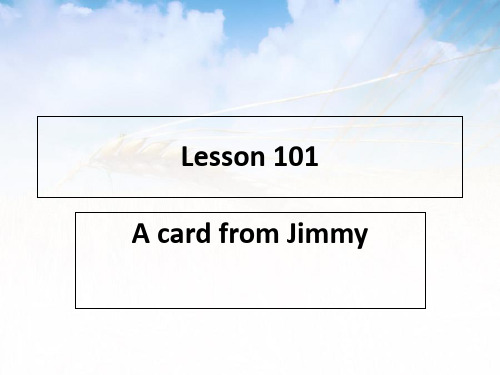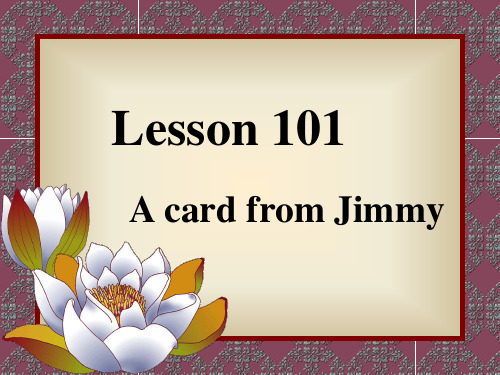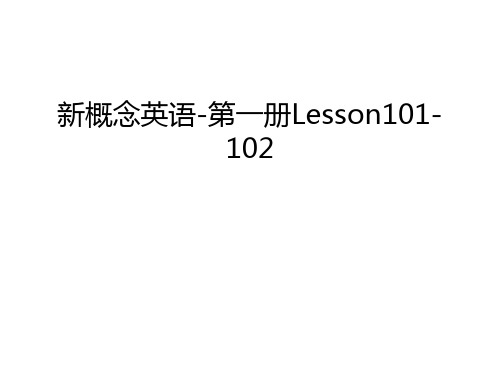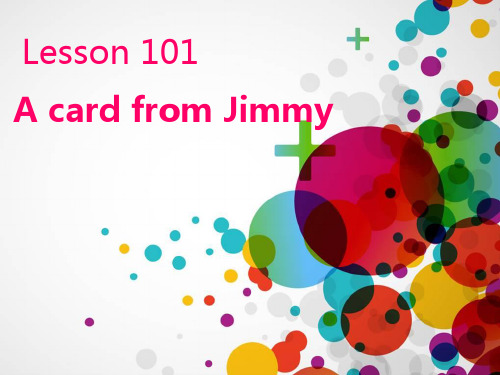新概念1--Lesson 101-102
新概念英语第一册101-102课件(共27张PPT)

• He doesn’t say very much, does he?
• 反意疑问句
• 由两部分组成,前面是一个陈述句,后面 是一个简略问句,中间用逗号隔开,反意 疑问句可以用来确认自己的判断,还可以 用来表示惊讶,愤怒等感情
• 如果前一部分陈述句是肯定形式,简略问 句就要用否定形式
• hostel /'hɒstl/
n. 招待所,旅馆
• association /əˌsəʊʃi'eIʃn/
n. 协会
• soon
adv. 不久
• write(wrote, written) v. 写
大不列颠及北 爱尔兰联合王国 the United Kingdom of Great Britain and Northern Ireland
park, the station)(小地点) • 我们十分钟前到达机场。
• We arrived at the airport the minutes ago.
• 他们刚刚到这个旅馆。
• They have just arrived at the hotel.
Text (2)
"I have just arrived in Scotland and I'm staying at a Youth Hostel."
•
14、 意 志 坚 强 的人 能把世 界放在 手中像 泥块一 样任意 揉捏。 2021年 8月7日 星期六 2021/8/72021/8/72021/8/7
•
15、 最 具 挑 战 性的 挑战莫 过于提 升自我 。。2021年 8月 2021/8/72021/8/72021/8/78/7/2021
新概念英语第一册 Lesson 101 - 102

反义疑问句
表示询问、惊讶、愤怒等感情。
结构: 陈述句
+ 简略疑问句
使用规则: A. 陈述部分与疑问部分的动词时态和动词性 质应保持一致 ; B. 陈述部分与疑问部分 “肯定” 和”否定” 形式彼此相反 。 He likes books, doesn’t he? The dinner isn’t ready, is it?
迪拜帆船酒店
Burj Al Arab hotel
association
n.协会,联盟
New Words
the Football Association
足球协会
soon
adv.不久, 很快, 早
New Words
我们很快就 回来。
我们一会再见。
write
v.写,写字;写作
New Words
He wrote some very famous books.
• The doctor comes at once, doesn’t he ? • They stay in a Youth Hostel, don’t they ?
• Jimmy didn’t write much,
did he
?
hasn’t he ? • Jimmy has arrived in Scotland,
Where did Jimmy stay in Scotland? Which association does Jimmy belong to? Did Jimmy say much? Why? Is grandmother happy to get a card from Jimmy? Why or why not?
新概念英语第一册101-102课课件 (共43张PPT)

本课内容
• • • • • • 单词学习 直接引语和间接引语 课文讲解 翻译句子 翻译对话 作业
单词学习
• • • • • • • Scotland n. 苏格兰(英国) card n. 明信片 youth n. 青年 hostel n. 招待所,旅馆 association n. 协会 soon adv. 不久 write(wrote, written) v. 写
• 如果直接引语为祈使句,变为间接引语时 多用“名词(代词)+不定式”结构。 • 1)引述表示命令的祈使句,常用动词order, tell, warn; • 2)引述表示请求的祈使句,常用动词ask, beg; • 3)引述表示建议、劝告的祈使句,常用动词 advise等。 • The boss said,“Please come here again tomorrow.” The boss asked me to go there again the next day.
She lost her youth.
She kept her youth.
• association n. 协会 • 我父亲是牙医协会的会长。 • My father was the president of the dental association. • 在组织或者机构前要加定冠词the • the United Nations • the International Olympic Committee
• 微博:58岁大姐吃得太多,胃爆炸了 • 著名微博达人“@营养师顾中一”是北京友谊医院的营养 师,拥有上百万粉丝,前天他转发了一条微博,说的是一 个病例:“患者女性,58岁,进食大量食物及啤酒,餐后 突发腹痛腹胀1小时来院急诊,患者腹胀如鼓,全腹压痛。 腹部CT显示,胃扩张。” • 尤其让人惊讶的是:“进腹时腹腔内高压可燃气体喷出, 灭火后手术继续。腹腔内大量黑色浑浊液体混有食物残渣, 胃壁破损严重,胃小弯贲门至幽门全程炸裂。” • 又是“胃爆炸”,又是“起火”,这场手术真是让人紧张。 最后的结果也是十分令人遗憾,由于患者病情太重,不得 不全胃切除。
新概念英语第一册 Lesson101-102 (共20张PPT)

注意: 没有Yes, he can’t./ No, he can.这种回答哦!
回答为肯定→Yes, +肯定回答. 回答为否定→No, +否定回答.
试一试:
( D) 1. His sister had a bad cough, _________ she?
=> 简略问句的主语要用___代_词____。如:
e.g. John has gone to Beijing, hasn’t he? 他去北京了,不是吗? You don’t like cats, do you? 你不喜欢猫,是吗?
需注意:当反意疑问句前半句为否定句时,回答要根 据实际情况作答。 e.g. Jimmy can’t speak English, can he? 吉米不会说 英语,对吗?
__S_t_a_y _at_h_o_m_e_t_h_es_e_d_a_ys_______.
2. You’d better go to school on foot. __G_o__to_s_c_ho_o_l _on__fo_o_t ___________.
He says he’s just arrived in Scotland. He says he’s staying at a Youth Hostel. You know he’s a member of the Y.H.A.
Role Play
课文详解
(1) Read Jimmy’s card to me please, Penny. 结构:祈使句 常用表达:read sth. to sb. 意为
给“_某_人_读__…__________” 试一试:请把下列句子改为祈使句 1. You must stay at home these days.
新概念1-Lesson101~102

新概念1-Lesson101~102新概念1-Lesson 101~102 来自Jerry的英语课堂00:0009:16 Lesson 101 A card from JimmyText 课文Listen to the tape then answer this question. Does Grandmother seem pleased to get a card from Jimmy? Why/Why not?听录音,然后回答问题。
收到吉米寄来的一张明信片,祖母是否显得高兴?为什么/为什么不高兴?GRANDMOTHER: Read Jimmy's card to me please, penny.PENNY: 'I have just arrive in Scotland and I'm staying at a Youth Hostel.'GRANDMOTHER: Eh?PENNY: He say he's just arrived in Scotland. He says he's staying at a Youth Hostel. You know he's a member of the Y.H.A.GRANDMOTHER: The what?PENNY: The Y.H.A., Mum. The Youth Hostels Association.GRANDMOTHER: What else does he say?PENNY: 'I'll write a letter soon. I hope you all well.'GRANDMOTHER: What? Speak up. Penny. I'm afraid I can't hear you.PENNY: He say he'll write a letter soon. He hopes we are all well. 'Love, Jimmy.'GRANDMOTHER: Is that all? He doesn't say very much, does he?PENNY: He can't write very much on a card, Mum.New words 生词Scotland ['skɔtlənd] n.苏格兰(英国)card [kɑ:d] n.明信片youth [ju:θ] n.青年hostel ['hɔstəl] n.招待所,旅馆association [əˌsəusi'eiʃən] n.协会soon [su:n] ad.不久write [rait] v.写Grammar focus 语法1. Read Jimmy's card to me. 请把吉米的明信片念给我听听。
新概念英语-第一册Lesson101-102教学内容

你的结论是: 主句是一般现在时的宾语从句,从句可以是任何一种形11 式
Listening
• Look at P 207. Lesson 102. • Look and listen. Do not speak. • Then answer the questions. • Listen again, repeat. • Do Exercise A & B
15
card [kɑ:d]n. 明信片; 卡片 credit card
post card
信用卡
an ID card 身份证
student
ID card 学生证
16
a birthday card a new year card
生日卡片
新年贺卡
a business card 名片
Hale Waihona Puke 17youth [ju:θ] 1)n. 青年人,年轻人(单复数同形) 那些年轻人很有礼貌。 The youth are very polite. 2)青年(少年)时期,青春时期 他年轻时学过意大利语。 He studied Italian in his youth. 3)青春
12
Summary
• 直接引语:直接引述说话人原来说的话称为直接引语。 • 间接引语:用自己的话转述说话人原来说的话称为间接
引语。 • 1.直接引语引在引号之内,而间接引语不用,但是常用
连词(that/if/when...), • 2.间接引语中宾语从句的动词要与主句的谓语动词的时
态保持一致。 • 3.变直接引语为间接引语时宾语从句的主语,宾语,状
he feels cold.
一般现在时
he will sell the house. 一般将来时
新概念英语第一册lesson101-102最新精编超详细讲解

?
• 5. They weren’t in Hangzhou last week, were they ?
• 6. He can speak a little French, can’t he
?
• 7. He can speak little French, can he
?
• 8. She never went to Shanghai, did she
6.陈述部分带有seldom, hardly, never, rarely, few, little, nowhere, nothing等否定词或半否 定词时,附加疑问部分的动词用肯定形式。如: Bob rarely got drunk, did he?
如果陈述部分的否定词带有否定前缀,那么,该 陈述部分作肯定处理,附加疑问部分一般仍用否 定形式。如:
He kept his youth. 他青春依旧
hotel hostel
association n.协会,联盟
CFA=China Football Association
中国足球协会 NBA= China Basketball Association
中国篮球协会
write v.写,写字;写作 write -- wrote-- written
3. 当陈述部分的主语是不定代词everything, nothing, anything, something时,附加 疑问句用it Everything seems all right now, doesn’t it? Nothing is kept in good order, is it?
Dear Mum
I haveHjue satyasrhrei’vsejdusitnarSrcivoetdlainnSdcotland.
新概念I-- lesson 101~102 A Card from Jimmy 完整教案

Lesson 101~102 A Card from Jimmy★Warm up1、直接引语和间接引语2、反义疑问句的用法生词表Scotland['skɑtlənd] n. 苏格兰(英国)card [kɑrd] n. 明信片Youth[ju:θ] n. 青年hostel[ˈhɑstl] n. 招待所、旅馆association[əˌsoʊʃiˈeɪʃn] n. 协会soon [su:n] adv. 不久write [raɪt] (wrote[rəʊt];written [ˈrɪtn] )v. 写Grandmother:Read Jimmy’s card to me please, Penny.Penny:“I have just arrived in Scotland and I’m staying at a Youth Hostel.”Grandmother:Eh?Penny:He says he’s just arrived in Scotland.He says he’s staying at a Youth Hostel.You know he’s a member of the Y.H.A.Grandmother:The what?Penny:The Y.H.A., mother. The Youth Hostel’s Association.Grandmother:What else does he say?Penny:“I’ll write a letter soon. I hope you are all well.”Grandmother:What? Speak up, Mary. I’m afraid I can’t hear you.Penny:He says he’ll write a letter soon. He hopes we are all well. “Love, Jimmy.”Grandmother:Is that all? He doesn’t say very much, does he?Penny:He can’t write very much on a card, mother.★listening1. Does grandmother seem pleased to get a card from Jimmy? Why? /Why not?Not really, she doesn’t think he write enough.2. Is Jimmy in Scotland Now? Yes, he is.3. Where is he staying? He is staying at a Youth Hostel.★Vocabulary● Scotland n. 苏格兰(英国)【记忆】Scotland = Scot (思考他)+land (懒得) → 到了苏格兰就懒得思考他。
- 1、下载文档前请自行甄别文档内容的完整性,平台不提供额外的编辑、内容补充、找答案等附加服务。
- 2、"仅部分预览"的文档,不可在线预览部分如存在完整性等问题,可反馈申请退款(可完整预览的文档不适用该条件!)。
- 3、如文档侵犯您的权益,请联系客服反馈,我们会尽快为您处理(人工客服工作时间:9:00-18:30)。
Lesson 101-102
I.听写Last National ________, I ________ a trip to Beijing. I ________ a lot of exciting __________ there. Here are two of them. This one was ________ at Tian’anmen Square. It was ________ wonderful. That one was taken in the Summer Place. We took it on the ________. I had a good _________ in Beijing.
II. 完成下列反义疑问句
I. 1. It isn’t snowing hard now, _________________?
2. You haven’t seen the film yet, ___________________?
3.Mary studied very hard, ________________________?
4. Mother has cooked the meal, ____________________?
5. Peter hopes to wash the clothes himself, ___________?
6. You have a sister, _____________________________?
7. He had a good swim the day before yesterday, ______?
8. Everyone likes her, ____________________________?
9. There is never a sports meeting held in our school, __________________________________________?
10. She was unhappy just then, ____________________?
11. Everyone is in the classroom, __________________?
12. He can hardly swim, _________________________?
13. I think chicken can swim, ______________________?
14. You’d better go to bed early, ___________________?
15. Let’s go for a walk, ___________________________?
16. --- You are not going out today, are you?
--- ________________________. I want to go shopping.
17. He has hardly finished his work, ________________? III直接引用转间接引语
.1. “Can I help you?” she asked.
___________________________________________
2. He said, “I will go to America this year.”
___________________________________________
3. “I will be leaving tomorrow, ”he told me.
___________________________________________
4. “I have told you I don’t want to go.” Said Jane.
___________________________________________
5. He said he loved me very much.
___________________________________________
7. “How old are you? ”she asked.
___________________________________________
8. “Which house do you live in?” Mary said.
___________________________________________
9. “Do you want to go to the movies with me?” he said.
___________________________________________
IV选择1. Linda ate nothing this morning, ___? A. didn’t she B. was she C. did she D. wasn’t she
2. There’s hardly___ milk in the bottle, _____there?
A. no, isn’t
B. some, is
C. little, isn’t
D. any, is
3.He has never ridden a horse before, ___?
A. does he
B. has he
C. hasn’t he
D. doesn’t he
4. — He seldom came here, _____? — Yes sir.
A. didn’t he
B. does he
C. doesn’t he
D. did he
5. Everything seems all right, _____ ?
A. does it
B. don’t they
C. won’t it
D. doesn’t it
6. No one failed in the exam, _____ ?
A. was he
B. did one
C. did they
D. didn’t he
7. Neither you nor I am an artist, _____ ?
A. am I
B. aren’t we
C. are we
D. ain’t I
8. He can’t be her father, _____ he?
A. is
B. isn’t
C. can
D. can’t
9. They have no time to visit the museum, _____?
A. do they
B. haven’t they
C. don’t they
D. will they
10. You’d better go at once, _____ you?
A. hadn’t
B. did
C. didn’t
D. don’t
11.He used to get up at 6:30, _____ he?
A.didn’t he
B. did he
C. used he
D. wouldn’t he
12.He ought to win the first prize, _______ he?
A. mustn’t
B. oughtn’t
C. shouldn’t
D. Both B and C.
13.Let’s go there by bus, ___?
A.will you
B. shall we
C. don’t you
D. will you
14.Let us go to play football, ___?
A.will you
B. shall we
C. do we
D. are we
15.Don’t forget to give Polly so me food and change her water, ___? A. will you B. shall we C. won’t you D. do you
16.—Let’s go shopping this afternoon, _____? —All right. A. will we B. shall we C. don’t we D. are we
17. There is little water in the glass, ____?
A.isn’t there
B. isn’t it
C. is it
D. is there
18.There won’t be any concert this Saturday evening, _____ ? A. will there not B. will there C. is there D. won’t 19. — I guess she taught herself Japanese, ______? —Yes. A. don’t I B. did she C. do I D. didn’t she
20.I don’t believ e you are right, _____ ?
A.are you
B. do you
C. won’t you
D. do
21. I know you didn’t want to hurt me, _____ ? A. did you
B. didn’t you
C. do I
D. don’t I。
